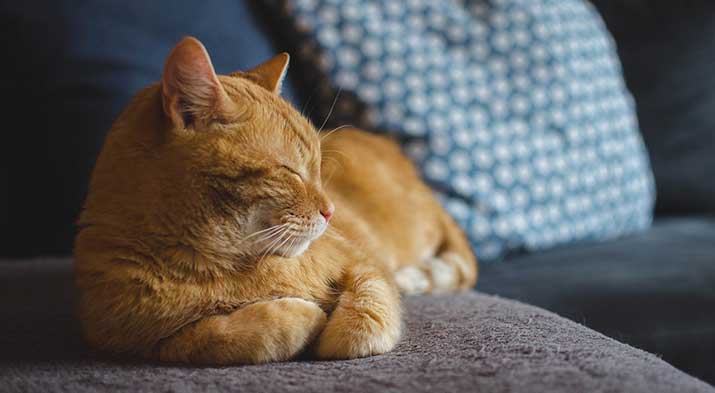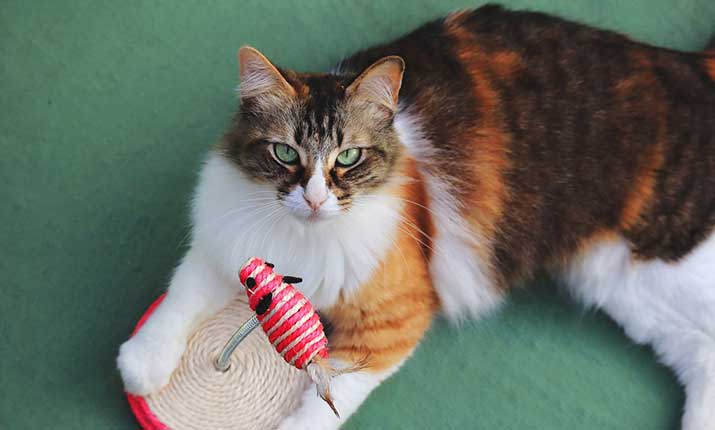
Cats love daytime snoozing and can spend up to 16 hours every day sleeping. You might spot your feline friend basking in the sunlight and catching some Zs at any given point during the day. They don’t call it a “cat nap” for nothing!
But despite the seemingly lazy daytime behavior, some cats come to life once the sun goes down! They can become hyperactive, doing everything they can to keep owners awake.
So what gives? Where does this behavior come from, and why do cats get so energized at nighttime?
Understanding Feline Sleeping Patterns
Cats typically sleep anywhere between 12 and 16 hours per day. That seems like a lot, but most of that time is split between bursts of energy. For example, your cat might spend some time awake before napping for a few hours.
But what about that odd burst of energy?
Contrary to popular belief, cats aren’t nocturnal. They can get active at night, which is why you often see strays roaming the shadows. But technically speaking, cats are crepuscular.
A crepuscular animal is most active during dawn and dusk hours. It’s not just cats that are like this. Many birds, reptiles, and wild mammals behave the same way.
The sudden urge to run around during twilight hours is pretty standard for cats despite how odd it seems to us diurnal humans. For wild cats, it’s the perfect time to hunt.
They can use their heightened sense of smell and enhanced nighttime visibility to find prey. While domesticated cats don’t need to worry about that, their prey drive remains and dictates their sleeping patterns.
4 Reasons Why Cats Stay Awake at Night
The crepuscular nature of cats explains why they don’t fall asleep at the same time humans do, but what about the all-night activity?
A feline’s sleep cycle is largely dependent on what they do during the day, and many factors could affect how they act at night.
Here are some potential reasons why your kitty isn’t letting you sleep through the night and what you can do to address them.
1. Too Much Sleep During the Day

Do you leave your cat home alone all day? Cats can find things to preoccupy their time, but they have their limits. Even in a house full of stuff, cats will often choose to nap while you’re away.
There’s nothing much to do, so why not?
Unfortunately, excess sleep during the day will rear its ugly head at night. Cats can’t sleep more than 16 hours. They still need to exercise, burn calories, and get tired.
If they spend all of their time snoozing while you’re at work, don’t be surprised if your cat uses the night hours to get their fix!
What to Do
The best thing you can do here is provide your cat with some extra things to do. Luckily, cats are pretty easy to please, and there’s no shortage of great toys to keep even the laziest cat occupied.
Try investing in a mental stimulation toy. Many great options keep your cat active even when you’re not home. You can also invest in a pet cam with a laser or an automatic treat dispenser.
If you want to go the extra mile, consider getting another cat! Two cats in one home will keep each other entertained, taking that burden off your shoulders.
2. A Lack of Play and Socialization

Don’t believe the rumors: Cats still need socialization to thrive! They might seem a bit aloof when you’re around, but felines need your attention, love, and interaction!
There are a few ways to tell if poor socialization and not enough play are to blame for your cat’s nighttime activity.
Usually, cats will go above and beyond to wake you. They might tackle your feet, swat at your face, or even knead your body as you sleep.
What to Do
For a short-term solution, try setting some boundaries. Close your door at night so that your cat doesn’t disturb you. Of course, that’s not going to address the issue entirely, so you’ll need to take steps to ensure that your cat gets all the socialization they need.
Make it a priority to play with them before bed.
Set some time aside and whip out those fun toys. Teasers are a great option for encouraging your cat to sleep.
You can use it to have fun and make them run all around just before bed. Lasers work well, too!
Rigorous playtime does double duty. It’ll give your cat all the interaction they need while also wearing out their energy supply!
Related: How Cold is Too Cold for Cats in a House?
3. Late Night Snacking
Sometimes, your cat’s appetite is to blame. We’ve all been there: Those late-night cravings can wake you up and make it difficult to sleep. Cats are the same way.
If your cat isn’t eating enough during the day, their stomach can wake them and put their instincts into overdrive. Remember: Cats usually hunt at dawn and dusk.
Cravings will only bring that need to hunt out of your cat.
What to Do
The best course of action is to modify your cat’s feeding schedule. Try feeding more frequent meals. That can be tough if you’re away at work. Many cats will ignore meals if they’re too big and given all at once.
If you’re not home to provide multiple small meals, invest in an automatic feeder. It’ll take care of feeding, ensuring that your cat is full by nightfall.
4. Possible Health Issues
Finally, health issues might be causing your cat to stay up later than you want. Older cats are more prone to issues that keep them up.
Chronic pain is the worst offender. Some cats hurt so much that they start wailing and meowing in the dead of night.
Arthritis is a common issue. However, increased energy from hyperthyroidism, conditions that cause frequent urination, and even anxiety could play a part in your cat’s odd sleep scheduling.
Feline dementia can cause issues due to poor memory and general sleep disturbance.
What to Do
Unfortunately, there’s no quick fix to this problem.
We recommend taking your cat to a vet. A professional can diagnose any potential health issues and possibly provide solutions that offer relief.
There’s no guarantee, but it’s worth a shot to help your cat sleep more comfortably.
Related: What Should I Feed a Hyperthyroid Cat?
Putting Sleepless Nights to Rest
Don’t let your cat prevent you from getting a full night of sleep! Whether the issue is a lack of stimulation during the day or a grumbling stomach, do what you can to address the problem.
Cats can learn to adapt to a healthier sleep schedule, but you have to put in the work to encourage it.
Also read: How Much Attention Do Cats Need?

